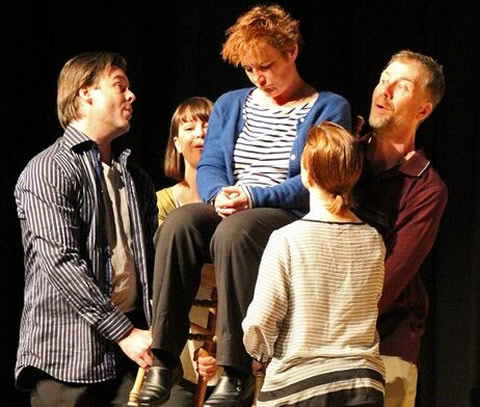Academic research usually ends up in specialized journals, but a U of T professor and her colleagues are harnessing the power of theatre to share important findings about dementia – and the stigma surrounding it – with a mainstream audience.
Cracked: New Light on Dementia follows the story of a woman who is diagnosed with dementia, and the impact this has on herself and those around her. The play’s main point is that people living with dementia can have a meaningful life, and that the true tragedy of the disease is in how we respond to it.
Pia Kontos, a professor in U of T’s Dalla Lana School of Public Health and a scientist at the Toronto Rehabilitation Institute, collaborated with three academic colleagues – Sherry Dupuis (University of Waterloo) and Gail Mitchell and Christine Jonas-Simpson, (both of York University) — to develop the research-based play to shift how society perceives people with dementia. (The title was inspired by lyrics to a Leonard Cohen song – “There’s a crack in everything, that’s how the light gets in.”)
Recognizing the need for good artistic direction, Kontos and her colleagues recruited theatre director and playwright Julia Gray, a PhD candidate at OISE, to write the script. “Theatre is a very powerful medium,” says Kontos. “It can challenge assumptions and practices that are taken for granted, and open audiences to new possibilities for supporting the humanity of people living with dementia.”
Kontos’s research shows that even when people with dementia have trouble making themselves understood through words, they are often able to express themselves through song, dance and gestures – removing one’s hat before dining, for example, or comforting another’s sadness with a gentle touch. “We’re saying, ‘Look at all the ways bodily movements are laden with meaning,’” says Kontos. “The body is hugely important for self-expression and connecting with others, particularly for people living with dementia.”
There’s a scene where the character with dementia seems to forget how to wash the dishes. Her daughter’s partner is drying, and, without saying a word, smiles and gently guides the older woman’s hands with the appropriate motion. There’s no criticism or exasperated outburst, just a simple gesture that helps the mother remember. The daughter witnesses the scene and later thanks her partner for finding such a compassionate way to assist her mother. “There is loss and sadness in dealing with dementia, but there’s also joy and learning and new possibilities,” says Kontos.
Many of the play’s humorous (in an eye-rolling way) moments occur during scenes set in a long-term care facility, where an overabundance of well-intentioned rules come across as unnecessarily harsh and impersonal – the tangle of forms and approvals needed so a family member can take a patient on an excursion or the minimal attention paid to a resident’s birthday on the grounds that it would be unfair to celebrate one person “more” than another. The group’s research shows that organizational rules in long-term facilities are inconsistent with good quality care. “We wanted to critically expose these inconsistencies,” says Kontos.
Another important theme is that relationships are crucial to the well-being of people with dementia. Yet the play doesn’t sugar-coat the strains a diagnosis can place on family members. Although the daughter is deeply engaged with her mother’s care, the son only reluctantly agrees to pay her a visit, and then immediately wants to leave. “There are those who struggle to cope. We want to highlight what we can achieve when we do come together and support one another,” says Kontos.

Kontos has not experienced dementia in her own family, but for her doctorate degree she conducted eight months of research in a residential long-term care facility. There, she says, she witnessed countless interactions among residents that challenge the dominant assumption that people with dementia are “socially dead.” She finished her research gravely concerned about care practices that deny people with dementia their dignity and vowed to “help others to see the humanity of people living with dementia and to make this world a better place for them.”
Cracked has been performed in a number of long-term care homes in Ontario and at a national conferences on dementia. It has been staged publicly as well, including at the SpringWorks Indie Theatre and Arts Festival in Stratford. Kontos recalls one audience member who had recently been diagnosed with Alzheimer’s saying that she would no longer “hide.” Another, an administrator in a care facility, said that she would rethink her institution’s policies.
Kontos and her colleagues are raising money for a Canadian tour, which they’d like to launch next year. “We feel everybody needs to see this play,” says Kontos, “because the tragedy of dementia is not dementia itself but rather the societal assumption that with dementia there is a premature closure of life.”
Cracked: New Light on Dementia is produced by Partnerships in Dementia Care Alliance, University of Waterloo, and based on research by Pia Kontos, Sherry Dupuis, Gail Mitchell and Christine Jonas-Simpson. For future performances follow @CrackedDementia, facebook.com/CrackedonDementia, and uwaterloo.ca/pidc.
Recent Posts
U of T’s 197th Birthday Quiz
Test your knowledge of all things U of T in honour of the university’s 197th anniversary on March 15!
Are Cold Plunges Good for You?
Research suggests they are, in three ways
Work Has Changed. So Have the Qualities of Good Leadership
Rapid shifts in everything from technology to employee expectations are pressuring leaders to constantly adapt






